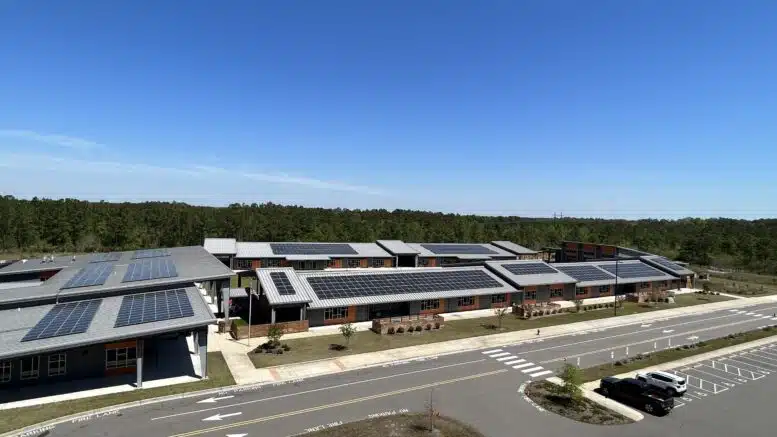By Will Atwater
The Girls Leadership Academy of Wilmington is committed to reducing its carbon footprint.
In 2023, with support from Cape Fear Solar Systems, the school — also known as GLOW — became “one of the top 10 largest [users of solar panels] in New Hanover County and the largest solar system on a school in eastern North Carolina,” according to information provided by the company.
And the 6-12 STEM-based academy, the state’s only single-gender public charter school, didn’t stop there. Looking for other opportunities to go green, it turned to its fleet of nine diesel school buses. The school relies on buses to bring students from New Hanover, Brunswick and Pender counties, according to Jen Wilson-Mathis, director of admissions and outreach.
Last year, GLOW Academy applied for a grant from the Biden administration’s Clean Bus School Rebate program, a $500 million program to improve the emissions performance of fleets nationwide. GLOW was waitlisted in the second round of the program, but their persistence paid off — they were approved in a $900 million second round of the program. They will receive $365,000 to offset the purchase of one electric bus.
“As a nonprofit, we look at different ways to make a dollar stretch,” Wilson-Mathis said. “Electric buses will help with saving on fuel costs and, ultimately, getting a reliable fleet is extremely important to us.”
Diesel exhaust has been linked to adverse health effects such as asthma and other respiratory illnesses, and can exacerbate heart and lung disease in children and older adults, according to information provided by the Environmental Protection Agency.
GLOW Academy’s solar panel program, its earlier foray into reducing its greenhouse gas emissions while cutting operating expenses, will “reduce carbon emissions by 639,000 pounds annually,” which is “equivalent to removing 665 passenger vehicles on the road and planting 4,800 trees.” The system will also save the school more than $1 million in electric bill expenses over 25 years, according to a release by Cape Fear Solar Systems.
Scientists have cautioned that unchecked greenhouse gas emissions can have detrimental effects on human health, such as increased respiratory and cardiovascular illness from pollution. Global climate change resulting from increased emissions could lead to more diseases transmitted by insects that survive warmer winters, as well as more heat-related deaths and other negative outcomes, such as more extreme storms and other weather events.
Recent heat events have been particularly acute in the southeastern U.S., where climate models predict temperatures will climb acutely in coming decades. Despite these predictions, a 2023 Duke University study found that states have lagged in planning for an increase in heat events.
A national push
The Biden Administration’s 2023 Clean Bus School Rebate program committed $500 million to “further improve air quality in and around schools, reduce greenhouse gas pollution fueling the climate crisis, and help accelerate America’s leadership in developing the clean vehicles of the future,” according to a release announcing the program. Demand quickly outstripped the earmarked money. As a result, the administration last week announced the $900 million third round of the school bus rebate program, which will provide 3,400 school buses to approximately 530 school districts, according to a release.
“President Biden believes every child deserves the opportunity to lead a healthy life and breathe clean air, and his Investing in America agenda is designed to deliver just that,” EPA Administrator Michael S. Regan said. “With [the] latest round of funding, we are transforming the nation’s school bus fleet to better protect our most precious cargo — our kids — saving school districts money, improving air quality, and bolstering American manufacturing all at the same time.”
North Carolina is expected to receive nearly $20 million to support the purchase of 59 electric school buses; 14 school districts across the state are listed to receive funding. There are currently 10,871 school buses in operation across the state; only 14 are electric buses, according to data provided by the North Carolina Department of Public Instruction.
As part of the federal initiative, President Biden wants half of all automotive sales to be electric vehicles by 2030.
EVs are taking hold in NC
In 2018, with an eye toward a more sustainable future for North Carolinians, Gov. Roy Cooper signed Executive Order No. 80. One goal was to “increase the number of registered, zero-emission vehicles” in the state to 80,000 by 2025. In March, the governor’s office announced that the number of registered zero-emission vehicles had reached the goal two years early.
As school districts are looking to add electric vehicles to their fleets through the federal rebate program, Walt Brandenburg, a senior account manager for Blue Bird Buses, said that electric school buses have advantages — but it’s important to consider all costs associated with the purchase.
The average amount provided by the federal rebate program to priority or (high-need) schools/districts to purchase an electric school bus is $365,000. Brandenburg said the actual cost of an electric school bus is between $390,000 to $400,000.
“What happens is that the bus is going to eat up all the $365,000 credit you’re getting,” he said. “So now you’ve got to come up with the balance [owed] for the EV bus plus whatever your charger is going to [cost].”
Brandenburg recommends that rural districts and others that run long bus routes to get students to and from school choose batteries with the highest kilowatt capacity and couple them with a level three (fast charger).
“EVs are not for everybody. If you’re within that battery capacity range, you can go out and get the kids, come back, and charge. [Then] go get the kids, come back and hook it up, and let it charge overnight; it’ll work well for you — there is nothing better.”
Wilson-Mathis said the federal rebate program aligns with GLOW Academy’s goal for its students.
“We’re really trying to make generational change here,” she said. “When you look at what we do at the school, that makes perfect sense when you think about the generational change that solar powered and electric buses can make.”













